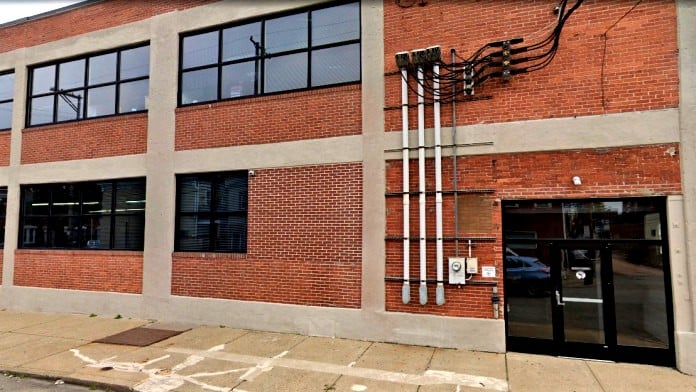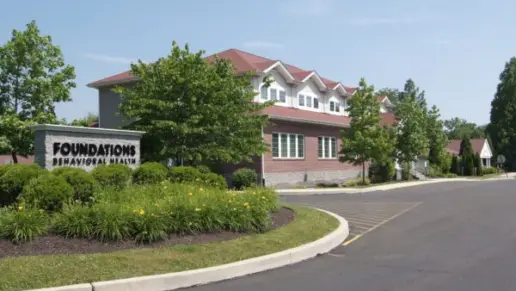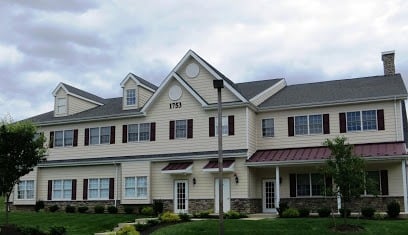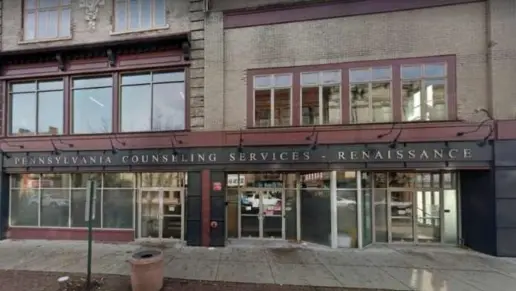About Cove Forge of Pittsburgh
Cove Forge of Pittsburgh, also known as Cove Forge Behavioral Health, is an outpatient drug and alcohol rehab based in Pittsburgh, Pennsylvania. It’s a satellite location for the main treatment center based in Williamsburg. They offer traditional and intensive outpatient programs, a partial hospitalization program, and a Chemical Offenders Referral and Education class.
As part of any of their addiction programs, you can participate in their Music Performance Group. Music therapy can help you communicate and work through deep feelings that you struggle to talk about. It also gives you a safe place to be curious and play as well as connect with people on a similar recovery journey.
This group meets several days a week to experiment with instruments and create music together. They then put on a weekly show for Cove Forge staff and community. They typically cover popular songs or songs written by members of the club. Cove Forge has even recorded these songs and released four CDs filled with stories of hope.
Something I like about Cove Forge of Pittsburgh is that they have telehealth options to make treatment even more accessible. Telehealth assessments and therapy sessions are available for qualifying participants of the outpatient and partial hospitalization programs. You can expect the same quality of care during your individual and group therapy sessions that happen virtually.
If you need a more intensive level of care, their main campus has a residential detox and addiction treatment program. The person you talk to during your initial consultation will let you know if inpatient treatment would be a better fit for your needs and will provide a referral at your request. They also provide family counseling and a dual diagnosis program for those living with co-occurring disorders.
Rehab Score
Gallery

Location
Accepted Insurance
Other Forms of Payment
Medicaid is a state based program that helps lower-income individuals and families pay for healthcare. Medicaid covers addiction treatment so those enrolled can use their coverage to pay for rehab. When a program accepts Medicaid the client often pays very little or nothing out of their own pocket.
Private insurance refers to any kind of healthcare coverage that isn't from the state or federal government. This includes individual and family plans offered by an employer or purchased from the Insurance Marketplace. Every plan will have different requirements and out of pocket costs so be sure to get the full details before you start treatment.
Self-pay involves paying for treatment out of your own pocket. You can use savings or credit, get a personal loan, or receive help from family and friends to fund your treatment. If you don't have insurance or your insurance plan doesn't cover a specific program, self-pay can help ensure you still get the care you need.
Financial aid can take many forms. Centers may have grants or scholarships available to clients who meet eligibility requirements. Programs that receive SAMHSA grants may have financial aid available for those who need treatment as well. Grants and scholarships can help you pai for treatment without having to repay.
Sliding scale payments are based on a client's income and family size. The goal is to make treatment affordable to everyone. By taking these factors into account, addiction recovery care providers help ensure that your treatment does not become a financial burden to you or your family, eliminating one barrier to care.
Addiction Treatments
Levels of Care
Treatments
The goal of treatment for alcoholism is abstinence. Those with poor social support, poor motivation, or psychiatric disorders tend to relapse within a few years of treatment. For these people, success is measured by longer periods of abstinence, reduced use of alcohol, better health, and improved social functioning. Recovery and Maintenance are usually based on 12 step programs and AA meetings.
Programs


Clinical Services
Cognitive Behavioral Therapy (CBT) is a therapy modality that focuses on the relationship between one's thoughts, feelings, and behaviors. It is used to establish and allow for healthy responses to thoughts and feelings (instead of unhealthy responses, like using drugs or alcohol). CBT has been proven effective for recovering addicts of all kinds, and is used to strengthen a patient's own self-awareness and ability to self-regulate. CMT allows individuals to monitor their own emotional state, become more adept at communicating with others, and manage stress without needing to engage in substance abuse. The rationale behind CBT is that all behavior is learned, including maladaptive behavior, and that individuals are both producers and products of their environments. The general goal of CBT is to create new conditions for learning.
Dialectical Behavior Therapy (DBT) is a modified form of Cognitive Behavioral Therapy (CBT), a treatment designed to help people understand and ultimately affect the relationship between their thoughts, feelings, and behaviors. DBT is often used for individuals who struggle with self-harm behaviors, such as self-mutilation (cutting) and suicidal thoughts, urges, or attempts. It has been proven clinically effective for those who struggle with out-of-control emotions and mental health illnesses like Borderline Personality Disorder.
Research clearly demonstrates that recovery is far more successful and sustainable when loved ones like family members participate in rehab and substance abuse treatment. Genetic factors may be at play when it comes to drug and alcohol addiction, as well as mental health issues. Family dynamics often play a critical role in addiction triggers, and if properly educated, family members can be a strong source of support when it comes to rehabilitation. At Cove Forge of Erie, they recognize the many ways that family members can be impacted by addiction, and the important role that they can play in their loved one’s recovery. Depending upon determinations that include need, clinical appropriateness, and the preferences of the individual in treatment, family therapy sessions may be scheduled on a case-by-case basis.
Group therapy is any therapeutic work that happens in a group (not one-on-one). There are a number of different group therapy modalities, including support groups, experiential therapy, psycho-education, and more. Group therapy involves treatment as well as processing interaction between group members. Cove Forge of Erie provides participants with several opportunities to reap the many benefits of group therapy. This form of therapy allows participants to learn from the experiences of others who are in similar situations, to share the insights that they have developed during their treatment, and to practice healthy interpersonal communication skills, all within a safe and structured environment that is moderated by a mental health professional.
In individual therapy, a patient meets one-on-one with a trained psychologist or counselor. Therapy is a pivotal part of effective substance abuse treatment, as it often covers root causes of addiction, including challenges faced by the patient in their social, family, and work/school life. One-on-one sessions between a participant and his or her primary counselor or therapist can be scheduled on an as-needed basis. Individual therapy can be beneficial to participants who need a more intensely personalized interaction in order to process successes or setbacks, or to address issues that may not be appropriate to discuss in a group therapy session.
Life skills trainings involve all the skills a person must have in order to function successfully in the world. These include time management, career guidance, money management, and effective communication. Truly successful addiction recovery is based on the ability to not only live substance-free, but to thrive. Life skills teaches the practical necessities of functioning in society, which sets clients up for success in life, and therefore sobriety.
Amenities
-
Residential Setting
-
Private Setting
Accreditations

The Commission on Accreditation of Rehabilitation Facilities (CARF) is a non-profit organization that specifically accredits rehab organizations. Founded in 1966, CARF's, mission is to help service providers like rehab facilities maintain high standards of care.
CARF Accreditation: Yes
Accreditation Number: 243272
Contact Information
2500 Jane St
2nd Floor
Pittsburgh, PA 15203






